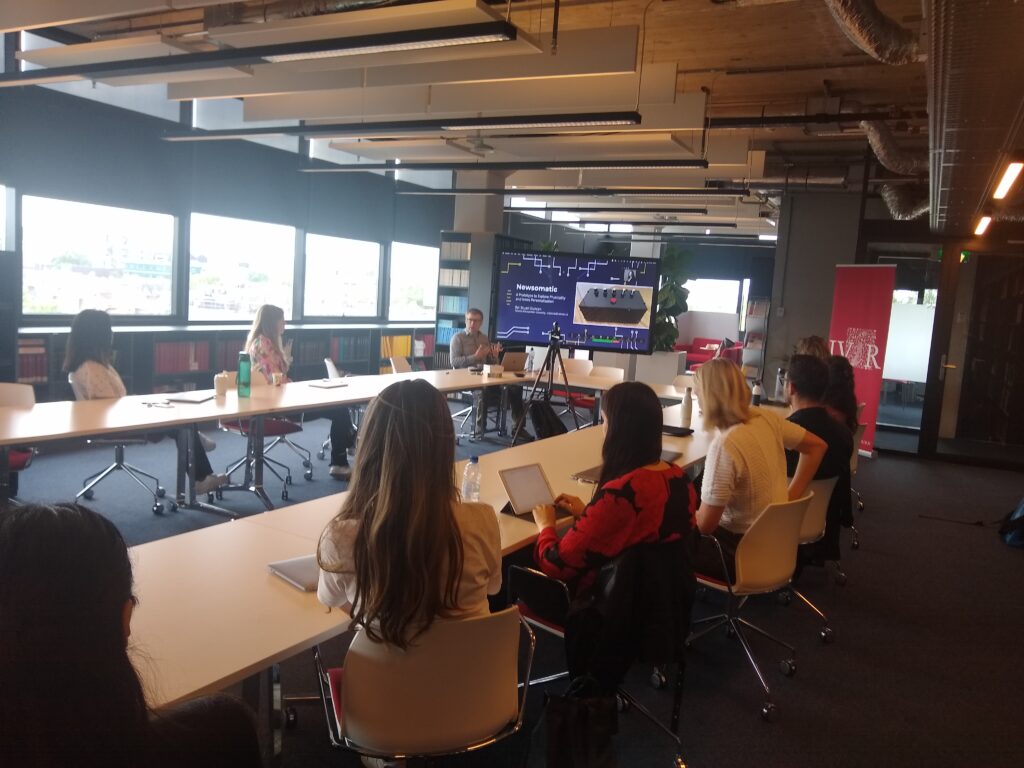Last week, we hosted a two-day workshop to discuss ways to study feedback loops in news recommendation. We discussed previous experiences on field experiments as well as ways forward. In particular, we worked on the development of a platform for field experiments on human-algorithmic feedback loops in news recommender systems. Building on earlier work from our group [1] [2], we worked towards further experiments to conduct within NEWSFLOWS and to further disseminate our approach to other interested researchers.

[1] Loecherbach, F., & Trilling, D.. (2020). 3bij3 ‐ Developing a framework for researching recommender systems and their effects. Computational Communication Research, 2(1), 53-79. http://dx.doi.org/10.5117/CCR2020.1.003.LOEC [PDF] [Bibtex]
@article{Loecherbach2020,
abstract = {Abstract Today's online news environment is increasingly characterized by personalized news selections, relying on algorithmic solutions for extracting relevant articles and composing an individual's news diet. Yet, the impact of such recommendation algorithms on how we consume and perceive news is still understudied. We therefore developed one of the first software solutions to conduct studies on effects of news recommender systems in a realistic setting. The web app of our framework (called 3bij3) displays real-time news articles selected by different mechanisms. 3bij3 can be used to conduct large-scale field experiments, in which participants' use of the site can be tracked over extended periods of time. Compared to previous work, 3bij3 gives researchers control over the recommendation system under study and creates a realistic environment for the participants. It integrates web scraping, different methods to compare and classify news articles, different recommender systems, a web interface for participants, gamification elements, and a user survey to enrich the behavioural measures obtained.},
author = {Loecherbach, Felicia and Trilling, Damian},
doi = {10.5117/CCR2020.1.003.LOEC},
issn = {2665-9085},
journal = {Computational Communication Research},
number = {1},
pages = {53--79},
title = {{3bij3 ‐ Developing a framework for researching recommender systems and their effects}},
url = {https://www.ingentaconnect.com/content/10.5117/CCR2020.1.003.LOEC},
volume = {2},
pdf = {https://computationalcommunication.org/ccr/article/view/11/11},
year = {2020}
}[2] Loecherbach, F., Welbers, K., Moeller, J., Trilling, D., & Van Atteveldt, W.. (2021). Is this a click towards diversity? Explaining when and why news users make diverse choices. Paper presented at the 13th ACM Web Science Conference 2021, New York, NY, USA. http://dx.doi.org/10.1145/3447535.3462506 [Bibtex]
@inproceedings{Loecherbach2021,
address = {New York, NY, USA},
author = {Loecherbach, Felicia and Welbers, Kasper and Moeller, Judith and Trilling, Damian and {Van Atteveldt}, Wouter},
booktitle = {13th ACM Web Science Conference 2021},
doi = {10.1145/3447535.3462506},
url = {https://dl.acm.org/doi/pdf/10.1145/3447535.3462506},
file = {:home/damian/SURFdrive/literatuur-mendeley/Loecherbach et al.{\_}2021.pdf:pdf},
isbn = {9781450383301},
keywords = {acm reference format,damian trilling,diversity,felicia loecherbach,judith moeller,kasper welbers,news recommender systems},
month = {jun},
pages = {282--290},
publisher = {ACM},
title = {{Is this a click towards diversity? Explaining when and why news users make diverse choices}},
year = {2021}
}